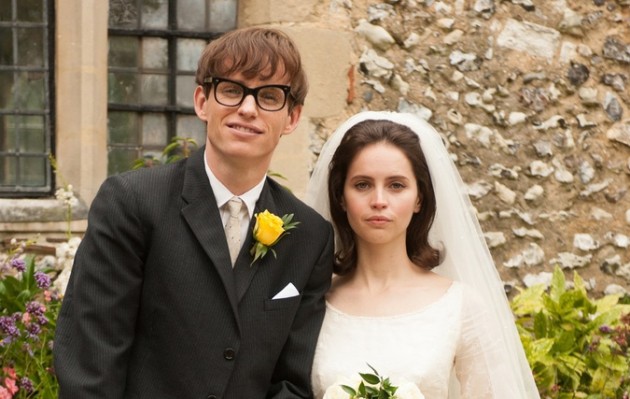There are mercifully few equation montages in Theory of Everything, the hazy, heartfelt biopic of celebrity English astrophysicist Stephen Hawking. There is a scene early on where Stephen (Eddie Redmayne), an spiritedly disorganised graduate student searching out a thesis topic at 1960s Cambridge, seeks inspiration by scribbling out theorems on a blackboard, with a hugging, affectionate camera angle and an upbeat piano score. Even then, what strikes clearest is the jittery chalk transcription, a warning of the doom to come. It is one of the film’s few concessions to the tropes of the ‘damaged genius’ biopic: elsewhere, an enthused physics student explains black hole theory by tracing beer foam on a bar table, and there’s more than one spot of handy exposition when a character rhymes off Stephen’s work for a curious third party. But this is not A Beautiful Mind, and the film understands mathematics’ finite dramatic appeal. There is, thank the lord, no monologues about how love is totally irrational and can’t be reduced to an equation (hello Interstellar). Theory is a film about the heart more than the head, and the terrible things that happen when everything else stops working.
Working off Travelling to Infinity: My Life with Stephen, the memoir of first wife Jane, Anthony McCarten’s script focuses on the playful romance between the two students and their shared endurance of Stephen’s cruel motor neuron affliction. The clever and affluent Hawking enjoys a blessed existence at the university, sleeping in, riding bicycles and solving math problems like the young hero of a dozen other English productions about sunny Oxbridge privilege.
But catastrophe hits quick and hard, and the budding researcher is given a truncated lifespan of two more years. The losses escalate: his ability to write, walk and, eventually, devastatingly, speak independently. Amidst the bodily rot and the pessimism of onlooker, including Stephen’s father (the always-great Simon McBurney), Jane (Felicity Jones) stands insistent and firm in her encouragement and support, the two forging a partnership, a collaboration even, that helps make his ground-breaking investigations into time and space possible in the first place. As the pair settle into shifting domestic and carer arrangements, Theory becomes a surprisingly moving story about a love, its origins and its dissolution, and the difficulties and triumphs in between. It tempers the narrative’s ‘eureka!’ temptations with workmanlike relationship normality, albeit one with glancingly-noted rich undercurrents.
Stephen exists in the cultural imagination as a kind of cartoon (sometimes literally), but Redmayne finds a fine line between the panto and the pathetic, all crumpled and angular like a collapsed star. Inevitably, his presence diminishes in line with his communicative abilities. Jones, though, is the irreducible element here; plucky and diminutive against her gangly partner, she steers them both through hardship with a steely composure, her facial expressions hinting at hidden wells of desperate, grieving frustration. The film sets out their gradual drifting apart without too much fuss: Jane is tempted by a lonely widower and his comfortable normality, while Stephen and his new nurse (played with a hint of vampish mischief by Maxine Peak) begin to share a jokey intimacy. If anything, a touch of fanfare would have lifted the second half, especially when the film starts sprinting through Stephen’s career to hit the landmarks and losses some of its emotional grit. It is, in form and style, ultimately indistinguishable from any number of glossy ITV dramas, but it is compassionately rendered and vividly performed. Starry-eyed but down to earth. Conor Smyth




